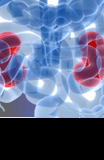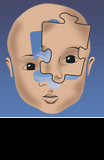Oxford parents to take part in national newborn genetic screening trial

Newborn babies in Oxford are starting to be tested for more than 200 rare genetic conditions as part of a national study that aims to screen up to 100,000 newborns in England.
Oxford University Hospitals is one of around 30 NHS trusts taking part in the Generation Study, a research programme being delivered by Genomics England in partnership with the NHS.
Overall, the study aims to recruit 100,000 newborn babies, whose genomes will be sequenced after birth, with their parents' consent
The sequencing identifies serious treatable, rare conditions shortly after a baby is born rather than when symptoms might appear later in childhood. Conditions tested for are expected to have an onset under the age of five years. This means families can access the right support, monitoring and treatment from the NHS much earlier for these conditions.
Early effective intervention can help to prevent longer-term health problems associated with certain conditions, keeping children out of hospital and helping them to live healthier lives.
The Generation Study was publicly launched in early October 2024 and now the first babies have been recruited at OUH.
Dr Helen Stewart, OUH consultant in clinical genetics, is the lead in Oxford for the study. She said: "Every day, nine babies are born in the UK with a rare genetic condition. Diagnosis shortly after birth would allow for much earlier treatment, which could dramatically improve a child’s prospects for a healthier life, as well as supporting a better quality of life for their families.
"By agreeing to take part, parents are not only potentially protecting their own child, but also helping us to learn more about genetic conditions and develop new treatments for them in the future."
The Generation Study – which was developed following extensive consultation with the public, parents, families affected by rare conditions, healthcare professionals, scientists and policymakers – will see newborn babies offered whole genome sequencing using blood samples which are usually taken from their umbilical cord shortly after birth.
Expectant parents will be informed about the study during pregnancy, and, if they are interested, a research midwife will have a detailed conversation with them to decide if they consent to take part.
Shortly after birth, an NHS doctor, nurse or midwife will confirm with parents that they are still happy for their baby to be tested; a blood sample will be taken and sent to a laboratory for whole genome sequencing.
Results are then reviewed by NHS genomic scientists, with the aim of sharing with parents within 28 days if a condition is suspected or within a few months if no conditions are suspected.
If a newborn baby is identified as having a treatable childhood condition through the genome sequencing, families and carers will be provided with further NHS testing to confirm a diagnosis and ongoing support and treatment from the NHS.
Consultant Midwife and co-Principal Investigator for the study at OUH, Sophie McAllister, added: "Expectant parents have the opportunity to sign up during pregnancy – either in person during a hospital appointment or over the phone. The study team will help you to understand the aims of the study and answer any questions. If you choose to take part, blood will be collected from the baby’s umbilical cord shortly after birth and this sample will be used to analyse the baby’s DNA.
"Researchers will be looking for specific genetic variants that are known to cause one of the conditions being screened for. Families will receive the results within a few months – and for 99% of the babies, none of the rare conditions will be detected."
The Generation Study is for research purposes and does not replace newborn blood spot screening – the so-called heel prick test – which is offered to all newborns across the UK and is used to detect for nine rare but serious conditions.
Currently, the Generation Study is aiming to detect more than 200 genetic conditions – some associated with the blood, some hormonal and others relating to the immune system – all of which can be successfully identified using sequencing technology, and for which treatment options are available on the NHS. The list of conditions may change throughout the study in response to any new evidence that is found.
The study is also designed to allow genomic data to be gathered for wider research purposes, allowing us to better understand rare genetic conditions and potentially pave the way for new diagnostic tools and treatments, and improvements in existing therapies.
In addition, the Generation Study will explore the risks and benefits of storing an individual’s genome over their lifetime; this could allow it to be reanalysed later in life if needed, enabling access to new developments in genomics.
Rachel Cressey, who previously joined the study, said: "I thought the Generation Study sounded like a really good idea. If a child is going to have a genetic condition, it would be better to pick it up on it earlier rather than later because that child can then have their diagnosis and any treatment it requires. It’s also a test that’s quick and easy."




























































